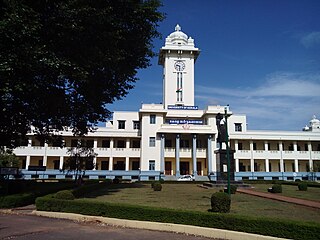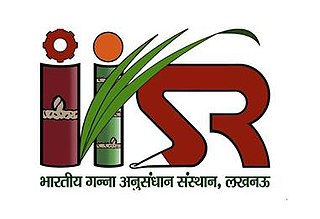Related Research Articles

Thanjavur, also known as Thanjai, previously known as Tanjore, is a city in the Indian state of Tamil Nadu. It is the 11th biggest city in Tamil Nadu. Thanjavur is an important center of southern Indian religion, art, and architecture. Most of the Great Living Chola Temples, which are UNESCO World Heritage Monuments, are located in and around Thanjavur. The foremost among these, the Brihadeeswara Temple, built by the Chola emperor Rajaraja I, is located in the centre of the city. This temple has one of the largest bull statue in India carved out of a single granite rock called Nandi. Thanjavur is also home to Tanjore painting, a painting style unique to the region. Thanjavur is the headquarters of the Thanjavur District. The city is an important agricultural centre located in the Kaveri Delta and is known as the Rice bowl of Tamil Nadu. Thanjavur is administered by a municipal corporation covering an area of 36.31 km2 (14.02 sq mi) and had a population of 222,943. Roadways are the major means of transportation, while the city also has rail connectivity. The nearest airport is Tiruchirapalli International Airport, located 59.6 km (37.0 mi) away from the city. The nearest seaport is Karaikal, which is 94 km (58 mi) away from Thanjavur. The city first rose to prominence during the reign of the Cholas when it served as the capital of the empire. After the fall of the Cholas, the city was ruled by various dynasties such as the Mutharaiyar dynasty, the Pandyas, the Vijayanagar Empire, the Madurai Nayaks, the Thanjavur Nayaks, the Thanjavur Marathas and the British Empire. It has been a part of independent India since 1947.

Tamil Nadu Agricultural University (TNAU) is the state agricultural university of Tamil Nadu located in Coimbatore, Tamil Nadu, India.

Sivaganga District is one of the 38 districts in Tamil Nadu state, India. This district was formed on 15 March 1985 by trifurcation of Ramanathapuram district into Ramanathapuram, Virudhunagar and Sivagangai districts. Sivaganga is the district headquarters. Karaikudi and Sivaganga are the most populous Towns in the district. It is bounded by Pudukkottai district on the Northeast, Tiruchirapalli district on the North, Ramanathapuram district on South East, Virudhunagar district on South West and Madurai District on the West. The area's other larger towns include Sivagangai, Kalayar Kovil, Devakottai, Manamadurai, ilayangudi, Thiruppuvanam, Singampunari and Tiruppattur. As of 2011, the district had a population of 1,339,101 with a sex ratio of 1,003 females for every 1,000 males.

Theni Allinagaram is a valley town and a municipality, situated in the Indian state of Tamil Nadu at the foothills of Western Ghats. It is the headquarters of the Theni district, located at a distance of 70 km from Madurai. As of 2011, the town had a population of 94,453. The metro area had the population of 202,100. It is known for the large-scale trading of garlic, cotton, cardamom, grapes, bananas, mango and chilli. It hosts the second largest weekly market in Tamil Nadu and the fourth largest in South India.
Tindivanam is a town and a municipality in Viluppuram district in the Indian state of Tamil Nadu. It is the second largest town in Villupuram District after the headquarters town Villupuram. Important roads from north to south Tamil Nadu pass through Tindivanam and similarly from west to east.

The importance and antiquity of education in Kerala are underscored by the state's ranking as among the most literate in the country. The educational transformation of Kerala was triggered by the efforts of the Church Mission Society missionaries, who were the pioneers that promoted mass education in Kerala, in the early decades of the 19th century. The local dynastic precursors of modern-day Kerala—primarily the Travancore Royal Family, the Nair Service Society, Sree Narayana Dharma Paripalana Yogam and Muslim Educational Society (MES)—also made significant contribution to the progress on education in Kerala. Local schools were known by the general word kalaris, some of which taught martial arts, but other village schools run by Ezhuthachans were for imparting general education. Christian missionaries and British rule brought the modern school education system to Kerala. Ezhuthu palli was the name used in earlier times. The word was derived from the schools run by the Buddhist monasteries. For centuries villages used to set up an ezhuthupally or ashan pallikoodam with one or two teachers. Students used to go this school from nearby areas and learn languages, literature, mathematics, grammar etc. After completing this students may continue study about specific subjects such as ayurveda, astrology, accounting etc. Censuses during 1800 shows that Travancore, Cochin, Kannur areas have many such schools. Even name list of ashans were used to be published along with the census.

The Vaigai Dam is built across the Vaigai River near Andipatti, in the Theni district of Tamil Nadu, southern India. Near the dam, the Government of Tamil Nadu has constructed an Agricultural Research Station for researching the growing of a variety of crops, including rice, sorghum, blackgram, cowpea and cotton.
Anbil Dharmalingam Agricultural College and Research Institute is an agricultural college at Navalur Kuttappattu village near Tiruchirappalli. It is part of the Tamil Nadu Agricultural University. It offers undergraduate degree in agriculture.
Athiyur is a village in the Kumbakonam taluk of Thanjavur district, Tamil Nadu India. It is located 44 km north of the district headquarters in Thanjavur. Agriculture is the basis of the economy. Almost every job and/or occupation is in some way or another agriculturally related.
Indian Institute of Rice Research formerly Directorate of Rice Research or IIRR is a rice research institute located in Rajendranagar near Hyderabad, Telangana.
Maruthuvakudi, also known as Aduthurai is a small panchayat town situated near Kumbakonam,in the Thanjavur District in the Indian state of Tamil Nadu. It is the sub urban region of business city of Kumbakonam.
Central Institute for Cotton Research(CICR), is a central research institute established in 1976 by the Indian Council of Agricultural Research to promote long term research efforts in cotton production and provide support and conduct applied research on cotton with the active involvement of State Universities.The research institute has two campuses one in Nagpur Maharashtra and the other in Sirsa Haryana. The research efforts of CICR fall under the All India Coordinated Cotton Improvement Project (AICCIP), initiated by the Council in 1967. Its headquarters are located in Nagpur and the other two regional units are located at Coimbatore, Tamil Nadu and Sirsa, Haryana.
Tirur village is a panchayat located in the Thiruvallur district of Tamil-Nadu state, India.

The Department of Agriculture and Farmers' Welfare one of the departments of Government of Tamil Nadu.
The Central Soil Salinity Research Institute (CSSRI) is an autonomous institute of higher learning, established under the umbrella of Indian Council of Agricultural Research (ICAR) by the Ministry of Agriculture, Government of India for advanced research in the field of soil sciences. The institute is located on Kachawa Road in Karnal, in the state of Haryana, 125 km (78 mi) from the Indian capital of New Delhi.

The Indian Institute of Sugarcane Research is an autonomous institute of higher learning, under the umbrella of Indian Council of Agricultural Research (ICAR) by the Ministry of Agriculture, Government of India for advanced research in sugar cane agriculture. The Institute is located on Raibareli Road, Dilkusha in Lucknow, Uttar Pradesh, India. While, The Central Sugarcane Research Institute established in 1912 is located in Coimbatore, Tamil Nadu, India. It works also under the Indian Council of Agricultural Research.
Ebrahimali Abubacker Siddiq is an Indian agricultural scientist, whose research in genetics and plant breeding is reported to have assisted in the development of various high-yielding rice varieties such as dwarf basmati and hybrid rice. The government of India honoured Siddiq in 2011 with the fourth-highest civilian award of Padma Shri.
K. Ramasamy is the former Vice Chancellor of Tamil Nadu Agricultural University, located in Coimbatore, Tamil Nadu, India, and also the Member of State Planning Commission of Tamil Nadu. He has served as Member in National Policy planning of Agriculture Biotechnology, Ferti-irrigation and Biogas Development.
Tamil Nadu Irrigated Agriculture Modernization and Water-Bodies Restoration and Management (TN-IAMWARM) is a multidisciplinary project funded by the World Bank and implemented by the Water Resources Organization (WRO), PWD and Government of the Indian state of Tamil Nadu as the Nodal Agencies. Tamil Nadu Agriculture University (TNAU) concentrates on the upscaling of water saving technologies in rice and major garden land crops. The total out lay for TNAU is Rs.88.90 crores.
Navalpakkam Parthasarthy, (1900–1993) was an Indian geneticist, executive secretary of International Rice Commission and Rice Advisor to the governments of Liberia and Thailand. The Government of India honoured him in 1958, with the award of Padma Shri, the fourth highest Indian civilian award for his services to the nation.
References
- ↑ "Tamil Nadu Agricultural University" (PDF). Government of Tamil Nadu website.
- ↑ "IRRI director visits research institute". The Hindu . 22 February 2011. Archived from the original on 26 February 2011.
- ↑ "Rice Research Station, Tirur". Tamil Nadu Agricultural University. Retrieved 25 February 2024.